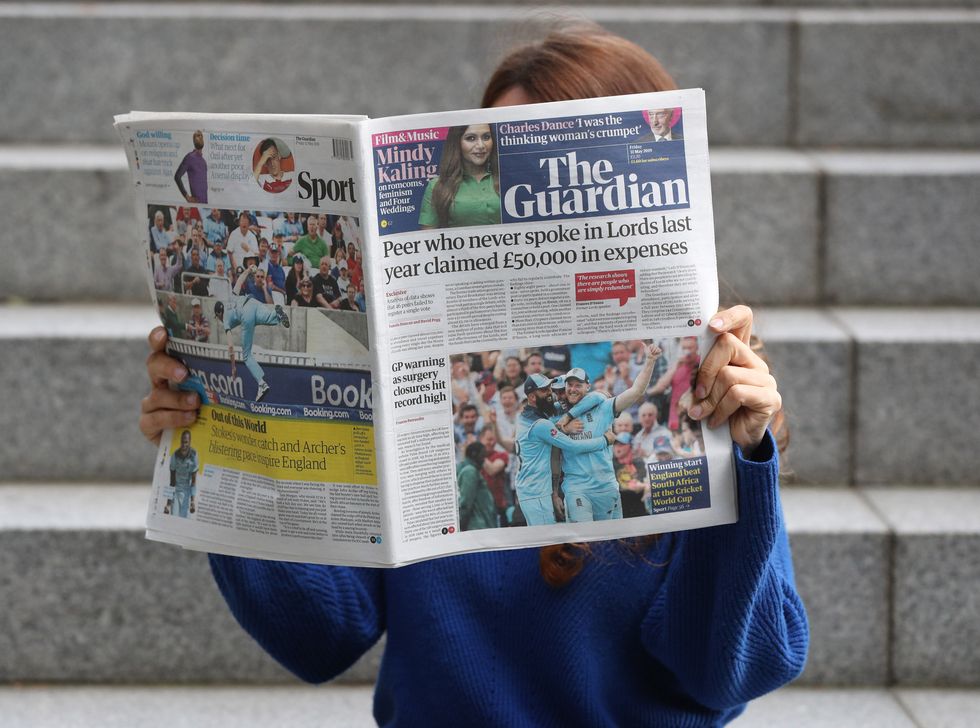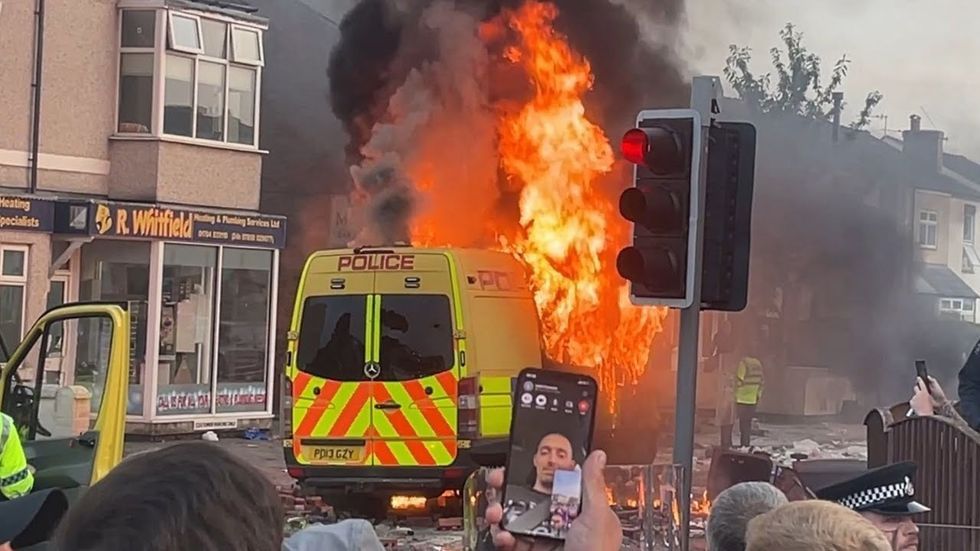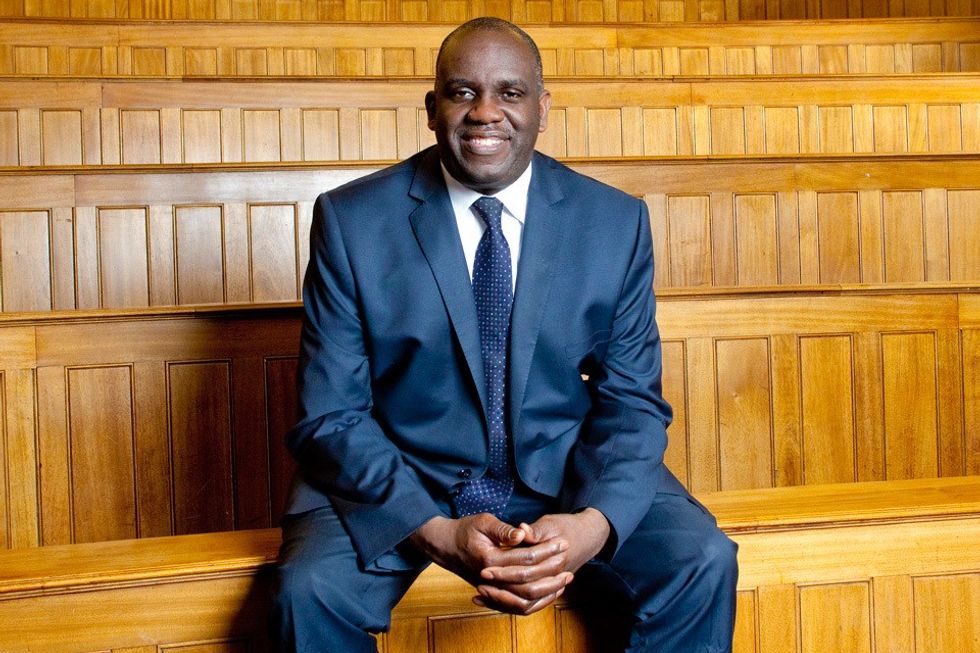James Saunders
Guest Reporter
Editors at The Guardian helped fan the flames behind the Southport riots, a Tory peer has claimed.
Lord Sewell said the "liberal elite" had ignored white working-class Britons for too long, and that the left-wing newspaper played a part in seeding discontent in the country's left-behind communities.
Instead, The Guardian preferred to promote ideas of racial "victimhood", Sewell, who previously led an inquiry into racial disparities in Britain, added.
Speaking at the Oxford Literary Festival, the peer said: "Those riots came out of [a] combination of two people: Guardian editors and arsonists.

"That kind of blinkered attitude, that liberal elite, that loves to go: 'I like my multiculturalism, I like my dining table conversation,' that kind of stuff, that goes on particularly in north London is fine - but it's not the same if you live in parts of Liverpool.
Lord Sewell also claimed that dismissive or hostile attitudes toward the UK's white working classes contributed to a "toxic mixture" which helped kick off the summer unrest.
And though he said he completely condemned the disorder, he added: "I don't think white working class people should be blamed for this."
A Guardian editorial column covering the aftermath of the "Stockport" riots - later corrected to "Southport" - warned of "far-right influence", and said the "violent disorder [was] fuelled by far-right activists, most of it aimed at asylum seekers and Muslims".
MORE ON THE SUMMER UNREST:

Further opinion pieces in the newspaper attacked "disinformation on social media" and implied that Nigel Farage had fuelled the unrest.
The newspaper did also acknowledge that young men who had participated were driven by "more social than political" motives.
Last summer's unrest unfolded in "left-behind" areas like Hartlepool, as well as Aldershot, Blackpool, Sunderland, Southport, Manchester and other locations.
Eventually, more than 800 charges were brought against those who participated.
GB NEWS, THE PEOPLE'S CHANNEL - READ MORE:

Sewell had chaired the Commission on Race and Ethnic Disparities, which was launched to scrutinise claims that Britain was a racist country in the wake of Black Lives Matter protests.
In 2021, it concluded that Britain was not institutionally racist.
The peer added that research showed white working-class men had far worse outcomes in Britain than many ethnic minorities.
Lord Sewell said The Guardian had led the backlash against his commission's conclusion, saying: "They wanted to know more about victimhood, more about racism, more about how these horrible white people are oppressing black people."
GB News has approached The Guardian for comment.
Find Out More...
Lord Sewell said the "liberal elite" had ignored white working-class Britons for too long, and that the left-wing newspaper played a part in seeding discontent in the country's left-behind communities.
Instead, The Guardian preferred to promote ideas of racial "victimhood", Sewell, who previously led an inquiry into racial disparities in Britain, added.
Speaking at the Oxford Literary Festival, the peer said: "Those riots came out of [a] combination of two people: Guardian editors and arsonists.

"That kind of blinkered attitude, that liberal elite, that loves to go: 'I like my multiculturalism, I like my dining table conversation,' that kind of stuff, that goes on particularly in north London is fine - but it's not the same if you live in parts of Liverpool.
Lord Sewell also claimed that dismissive or hostile attitudes toward the UK's white working classes contributed to a "toxic mixture" which helped kick off the summer unrest.
And though he said he completely condemned the disorder, he added: "I don't think white working class people should be blamed for this."
A Guardian editorial column covering the aftermath of the "Stockport" riots - later corrected to "Southport" - warned of "far-right influence", and said the "violent disorder [was] fuelled by far-right activists, most of it aimed at asylum seekers and Muslims".
MORE ON THE SUMMER UNREST:
- Nigel Farage makes personal statement on ‘life-changing’ Southport riot accusations
- Keir Starmer’s Southport silence 'risked collapsing' Rudakubana trial after PM accused of 'hushing up' killer’s identity
- Terror watchdog REJECTS demands to change 'terrorism' definition after Southport murders 'over fears of restricting freedom of expression'

Further opinion pieces in the newspaper attacked "disinformation on social media" and implied that Nigel Farage had fuelled the unrest.
The newspaper did also acknowledge that young men who had participated were driven by "more social than political" motives.
Last summer's unrest unfolded in "left-behind" areas like Hartlepool, as well as Aldershot, Blackpool, Sunderland, Southport, Manchester and other locations.
Eventually, more than 800 charges were brought against those who participated.
GB NEWS, THE PEOPLE'S CHANNEL - READ MORE:
- Historic port town to be returned to its former glory as £200MILLION revamp given go-ahead
- ‘Our women feel threatened!’ GB News investigation exposes REALITY of migrant hotels in Crewe
- Vote NOW for your favourite GB News stars in TV's TRIC Awards 2025

Sewell had chaired the Commission on Race and Ethnic Disparities, which was launched to scrutinise claims that Britain was a racist country in the wake of Black Lives Matter protests.
In 2021, it concluded that Britain was not institutionally racist.
The peer added that research showed white working-class men had far worse outcomes in Britain than many ethnic minorities.
Lord Sewell said The Guardian had led the backlash against his commission's conclusion, saying: "They wanted to know more about victimhood, more about racism, more about how these horrible white people are oppressing black people."
GB News has approached The Guardian for comment.
Find Out More...
